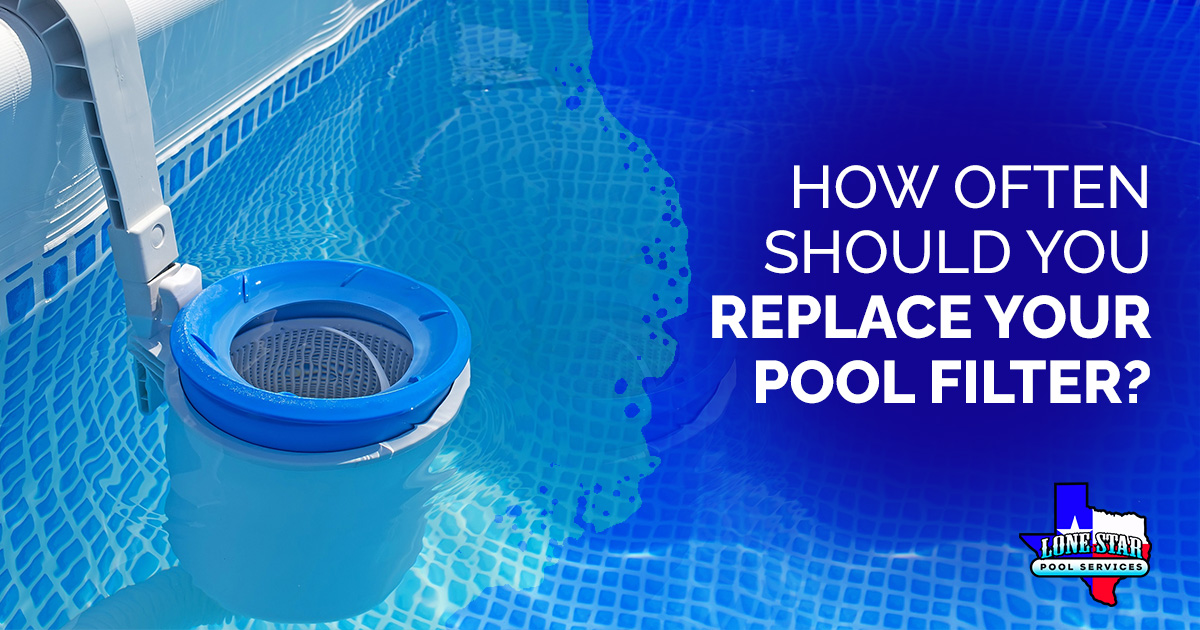Homeowners in Cypress and the greater Houston area often ask, “How often should you replace your pool filter?” The answer depends on the type of filter, local pool usage, and the frequency of maintenance. Let’s dig into when and why pool filters should be replaced, how to identify performance issues, and why routine filter maintenance is crucial for maintaining water clarity and system efficiency. Whether you use a cartridge, sand, or DE filter, understanding proper filter care helps extend the life of your equipment and reduces long-term repair costs.
Understanding the Importance of Your Pool Filter
The pool filter is responsible for removing debris, dirt, and fine particles from the water, helping maintain clear and sanitary conditions. It also plays a crucial role in supporting circulation and ensuring that chemical treatments are effective.
Without proper filtration, pool water becomes cloudy, algae growth increases, and circulation suffers. Over time, worn or clogged filters reduce system efficiency and increase pressure on the pump, potentially leading to higher energy bills or equipment failure.
In Cypress and other areas around Houston, pollen, dust, and other outdoor elements can put additional strain on filters. This makes regular pool inspection, cleaning, and timely replacement essential not just for visual clarity but also for protecting pool hardware.
Lone Star Pool Services emphasizes that a clean, functioning pool filter is not optional—it’s a necessary part of maintaining a safe and enjoyable swimming environment. Pool owners who understand the type of filter they have and how often it needs to be replaced can avoid unexpected maintenance problems and enjoy consistent water quality throughout the year.
Types of Pool Filters and Replacement Timelines
Different pool filter types have different lifespans and maintenance needs. The three most common types are cartridge filters, sand filters, and diatomaceous earth (DE) filters. Understanding how often to replace your pool filter depends heavily on the type of system your pool uses. Below is a breakdown of each filter type and its expected replacement schedule.
Cartridge Pool Filters: How Often Should They Be Replaced?
Cartridge filters are popular among residential pool owners in Cypress due to their efficiency and ease of maintenance. On average, cartridge filters should be replaced every 2 to 3 years. However, this can vary depending on pool usage, water quality, and the frequency of cartridge cleaning.
Routine cleaning is usually recommended every 4 to 6 weeks during the swimming season. Over time, even regular cleaning won’t restore full performance. If the cartridge shows signs of wear, such as frayed pleats, cracking, or persistent low pressure, it may be time to replace it.
Signs that a cartridge pool filter needs replacement:
- The filter is no longer maintaining clear water despite the chemical balance
- PSI remains low or fluctuates unusually
- Water circulation is reduced.
- Cleaning the cartridge no longer improves flow or clarity.
Lone Star Pool Services offers inspection and replacement services for cartridge filters as part of their regular maintenance packages or as a one-time service for Cypress-area pool owners.
Sand Pool Filters: How Often Should You Change the Sand?
Sand filters are another standard option, especially for larger or older pools. The filter media (sand) inside the tank typically needs to be replaced every 5 to 7 years. While the filter tank itself may last longer, the sand gradually becomes less effective at trapping debris and contaminants over time.
In the Cypress climate, where wind, organic material, and seasonal storms can impact water quality, sand filters may require more frequent monitoring.
Signs it may be time to change the sand in your filter:
- Cloudy water that persists even after shocking the pool
- Increased need for backwashing
- Poor circulation or uneven distribution of filtered water
- Sand leaking into the pool from return jets.
Lone Star Pool Services recommends having the sand inspected during your annual service visit to ensure optimal filtration performance.
DE (Diatomaceous Earth) Pool Filters: Replacement Considerations
DE filters offer the highest level of filtration, capturing particles as small as 2–5 microns. While the DE powder needs to be replenished after each backwash, the internal grids or filter elements typically require replacement every 7 to 10 years or sooner if damage occurs.
Indications that your DE filter may need service or replacement:
- Powder returning to the pool through the returns
- Cracks in the filter grid or manifold
- Decreased flow rate or increased system pressure
- Frequent clogging despite regular DE recharging
Because DE systems are more complex, Lone Star Pool Services recommends professional inspection to assess wear and ensure safe operation, particularly in older systems.
How to Know If Your Pool Filter Needs Replacing
Even with routine maintenance, pool filters will eventually lose their effectiveness. Recognizing the signs of filter failure can help homeowners in Cypress and Houston prevent more serious water quality issues and avoid unnecessary strain on pool equipment. The key is to understand both visual indicators and mechanical symptoms that suggest a filter is due for replacement.
Visible Signs That Your Pool Filter Is Failing
Changes in the appearance of the water are often the first indication that the pool filter is no longer functioning correctly. These visual signs include:
- Cloudy or murky water despite proper chemical levels
- Recurring algae growth, even after shock treatments
- Increased floating debris that doesn’t clear with filtration
- Discoloration or staining on pool surfaces
If any of these issues persist after chemical adjustments or manual cleaning, it may indicate that the filter media is no longer effectively trapping contaminants.
Mechanical and System Indicators
In addition to visible problems, mechanical issues can signal that the pool filter is approaching the end of its usable life. These include:
- Low or fluctuating PSI (pounds per square inch) readings on the filter gauge
- Reduced water circulation, which may affect heating and chlorination
- Longer pump run times to maintain clarity or flow.
- Frequent need for backwashing (in sand and DE filters) with limited improvement
When these symptoms occur, it’s essential to determine whether the filter requires cleaning or if a full replacement is more suitable. Delaying replacement can lead to pump damage, energy inefficiency, and increased operational costs.
Lone Star Pool Services advises Cypress homeowners to have their pool filtration systems professionally inspected at the first sign of system stress to avoid more extensive repairs down the line.
How Often Should You Clean vs. Replace Your Pool Filter?
Understanding the difference between cleaning and replacing a pool filter is essential for maintaining optimal water clarity and system efficiency. While routine cleaning helps extend the life of your filter, all pool filters have a limited lifespan and will eventually need to be replaced.
Cleaning Frequency by Filter Type
Each filter type has specific guidelines for cleaning to maintain effectiveness:
- Cartridge filters Should be removed and cleaned every 4 to 6 weeks during peak usage. Rinse with a garden hose and soak in a filter cleaner when needed.
- Sand filters: Require backwashing every 4 to 6 weeks or when pressure increases by 8–10 PSI above normal.
- DE filters: Need backwashing and recharging with DE powder after each backwash, typically every 4–8 weeks, depending on usage and debris load.
Cleaning removes buildup and restores flow, but it cannot reverse the effects of filter wear or damage. Filters that are cleaned regularly will still need to be replaced on schedule based on material fatigue and declining performance.
When Cleaning Is No Longer Enough
Some signs indicate that cleaning alone is no longer sufficient:
- The filter does not return to normal PSI after cleaning
- Water clarity remains poor despite chemical balance.
- You notice damage, such as cracks, collapsed pleats, or worn-out filter grids.
- Cleaning intervals become more frequent with less impact.
For Cypress-area pool owners, weather conditions, high pollen, and frequent pool use during hot seasons can accelerate the need for replacement. Lone Star Pool Services helps homeowners determine the right balance between cleaning frequency and timely replacement to maintain system reliability.
Why Cypress, TX Pool Owners Need Routine Filter Maintenance
In Cypress and surrounding areas of Houston, the environment poses unique challenges that make routine pool filter maintenance essential. From seasonal pollen and heavy rainfall to high summer temperatures, local conditions can significantly increase the strain on residential pool systems.
Environmental Factors That Affect Pool Filters
Homeowners in Cypress may notice their filters becoming clogged or less effective more quickly due to:
- High pollen counts in spring and early summer
- Dust and debris from nearby construction or landscaping
- Frequent rainstorms, which can introduce organic material and contaminants
- Extended swim seasons, leading to increased swimmer load and chemical use
These conditions can reduce filter performance and increase the frequency of cleaning and backwashing. Over time, this added stress leads to premature wear and tear.
Protecting Pool Equipment Through Preventive Care
Neglecting regular pool filter maintenance doesn’t just affect water clarity — it also puts other equipment at risk. A dirty or damaged filter can force the pump to work harder, resulting in:
- Higher energy bills
- Reduced circulation and ineffective chemical distribution
- The shortened lifespan of pumps and heaters
Regular filter care helps prevent algae growth, protects pool surfaces, and reduces the risk of cloudy or unsafe swimming conditions. Lone Star Pool Services provides proactive maintenance plans specifically tailored to the needs of Cypress homeowners, ensuring that filters are cleaned, inspected, and replaced at the proper intervals.
Their trained technicians understand the regional demands and make filter upkeep simple and stress-free for pool owners.
Professional Filter Inspections: When to Call the Experts
While regular DIY cleaning is essential, there are times when a professional pool filter inspection is necessary. An expert can identify early signs of filter failure, diagnose pressure issues, and recommend whether a cleaning, repair or full replacement is the most effective solution.
What to Expect from a Filter Service
Lone Star Pool Services provides comprehensive pool filter inspections as part of its regular and one-time maintenance offerings. During a filter service visit, technicians will:
- Inspect the filter media (cartridge, sand, or DE grids) for signs of wear and tear.
- Inspect system pressure and water flow levels.
- Evaluate the condition of seals, gauges, and backwash valves.
- Perform a deep cleaning or recommend replacement if needed.
By addressing minor issues before they escalate, homeowners can enjoy consistently clean water and avoid unnecessary downtime during peak swim season.
Book a Pool Filter Service with Lone Star Pool Services Today
Don’t wait for cloudy water or equipment damage to take action. Whether you need a routine filter cleaning, a complete filter replacement, or a professional inspection, Lone Star Pool Services is here to help.
👉 Call us today at 📞 (832) 928-3017 to speak with a technician
👉 Or schedule your pool filter check-up online — quick, easy, and available 24/7
Serving Cypress and surrounding Houston communities, Lone Star Pool Services makes pool filter maintenance hassle-free and reliable.

